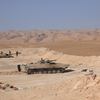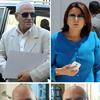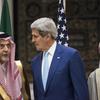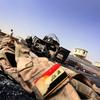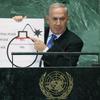Rami Khouri appears in the following:
100 Years of 100 Things: US Involvement in the Middle East
Monday, November 18, 2024
Palestinian Perspective
Tuesday, October 10, 2023
Israelis and Palestinians React to Trump's Visit
Wednesday, May 24, 2017
A Changing Landscape in the Syrian War
Monday, August 29, 2016
French, U.S. Airstrikes Kill More Than 100 Civilians in Syria
Thursday, July 21, 2016
In Syria, U.S. Takes a Back Seat to Russia
Monday, March 07, 2016
Getting Middle Eastern Boots on the Ground Against ISIS
Monday, November 23, 2015
The 2015 Nobel Peace Prize Goes To...
Friday, October 09, 2015
The Leaders Speak
Monday, September 28, 2015
How To Build A Coalition Against ISIS
Monday, September 15, 2014
Iraq: Obama Weighs His Options
Thursday, June 19, 2014
President Obama met with Congressional leaders yesterday to outline the scope of violence in Iraq, and what the US should do in response. Rami Khouri, director of the Issam Fares Institute for Public Policy and International Affairs at the American University of Beirut, and David Sanger, New York Times national security correspondent and author of Confront and Conceal (Broadway, 2013), talk about the range of options, from more personnel on the ground to air strikes and diplomatic pressures.
College Basketball and the Constitution
Friday, April 05, 2013
Rami Khouri, director of the Issam Fares Institute for Public Policy and International Affairs at the American University of Beirut, on how his beloved Syracuse basketball team's zone defense got him thinking about judicial review, the American constitution, and national life.
Violence Continues in Lebanon
Monday, October 22, 2012
Middle East at the U.N.
Friday, September 28, 2012
Rami Khouri, director, Issam Fares Institute for Public Policy and International Affairs at the American University of Beirut, talks about the Netanyahu and Abbas speeches at the U.N. and other news from the Middle East.
Palestinian Unity Government
Thursday, May 05, 2011
Rami Khouri, director of the Issam Fares Institute for Public Policy and International Affairs at the American University of Beirut, and David Makovsky, senior fellow and director of the Project on the Middle East Peace Process, The Washington Institute, discuss the formation of a Palestinian Unity government and the implications for Israel and Palestine, as well as the role Egypt played in brokering the deal.
Libyan Ceasefire
Friday, March 18, 2011
Moammar Gaddhafi's government agreed to a ceasefire this morning, in a dramatic about face following the UN Security Council authorization of military action and a no-fly zone over Libya. Rami Khouri, director of the American University of Beirut’s Issam Fares Institute for Public Policy and International Affairs, discusses events leading up to the ceasefire, and what it means for Gadhafi and the anti-government protests in Libya.
The Palestine Papers
Monday, January 24, 2011
Rami Khouri, director of the Issam Fares Institute for Public Policy and International Affairs at the American University of Beirut, reviews the documents leaked to Al Jazeera from Palestinian/Israeli negotiations.
WikiLeaks and the Arab World
Thursday, December 02, 2010
Rami Khouri, director of the Issam Fares Institute for Public Policy and International Affairs at the American University of Beirut, talks about the portrayal of Arab leaders in the WikiLeaks cables, and the response overseas.
Middle East Peace Talks
Thursday, September 02, 2010
Rami Khouri, director of the Issam Fares Institute for Public Policy and International Affairs at the American University of Beirut, and David Makovsky, senior fellow and director of the Project on the Middle East Peace Process at The Washington Institute, discuss the current Middle East peace talks in Washington.
The Legacy of Lebanon's Top Shia Muslim Cleric
Monday, July 05, 2010
Lebanon's top Shia Muslim cleric, Grand Ayatollah Mohammed Hussein Fadlallah died yesterday. He was revered for bridging religious divides and for promoting social services and women's rights. Rami Khouri, Director of the Issam Fares Institute for Public Policy and International Affairs at the American University of Beirut, remembers the cleric. Khouri says that Fadlallah was an enlightened and progressive man in the class of Martin Luther King. However, the cleric was also known as a spiritual leader to Hezbollah and Washington labeled him a terrorist because of this association.



